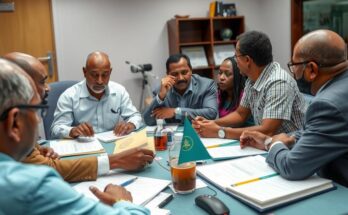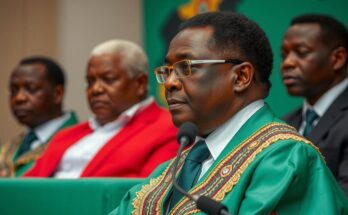Germans are set for elections following the collapse of Chancellor Scholz’s coalition. Issues at play include the rise of the far-right, economic stagnation, and foreign relations, particularly regarding Ukraine. Current polls indicate a strong lead for the CDU, with potential repercussions across domestic policies and international partnerships.
Germans are poised to vote in early 2024 after Chancellor Olaf Scholz’s coalition government, known as the “traffic light” coalition comprising the Social Democratic Party (SPD), the Greens, and the Free Democrats (FDP), collapsed on November 6, 2023. Scholz’s dismissal of Finance Minister Christian Lindner sparked the coalition’s breakdown during budget negotiations. The upcoming election, scheduled for February 23, 2024, promises to address pressing issues, including the far-right’s rise, economic stagnation, and foreign policy challenges amid the ongoing conflict in Ukraine. The coalition had always been tenuous, particularly due to the FDP’s fiscal conservativism, which clashed with the SPD and Greens’ calls for increased social spending and climate action. Scholz accused Lindner of playing politics with government support for Ukraine against domestic pensioners and indicated that the FDP had orchestrated the collapse to trigger an early election. Senior political analyst Markus Ziener remarked on the difficulty of reconciling the differing ideologies within the coalition, which ultimately weakened Germany’s position in the EU. Currently, opinion polls show the Christian Democratic Union (CDU) leading with 32 percent, suggesting a potential return to a “grand coalition” with the SPD or an alliance with the Greens. Friedrich Merz, CDU leader, advocates for significant policy changes including rolling back climate reforms and tightening immigration. Meanwhile, the far-right Alternative for Germany (AfD) is expected to achieve historic polling figures, despite its controversial status and refusal from other parties to form coalitions with it. Important foreign policy challenges are on the horizon, particularly with Donald Trump’s potential return to the White House and his threats to reduce military support for Ukraine. Scholz’s cautious engagement with Russia contrasts with Merz’s hawkish stance on weapons delivery. Economically, Germany faces pressures from proposed US tariffs that could exacerbate its slow growth trajectory. As the country prepares for elections, discussions around reforming Germany’s debt brake mechanism have emerged, as political leaders are urged to boost public investment. Despite the challenges ahead, a shift in the political consensus towards debt financing could be essential for addressing critical national issues, such as defense and renewable energy initiatives.
The article discusses the imminent elections in Germany following the collapse of Chancellor Olaf Scholz’s coalition government. The backdrop of this political shift involves internal ideological conflicts among coalition members concerning fiscal policies and government spending, particularly in relation to climate initiatives and support for Ukraine. The rise of the far-right and the challenges posed by the potential return of Donald Trump to US politics further complicate the electoral landscape. The economic stagnation of Germany is also a pivotal issue that candidates must address as they prepare for the polls.
In summary, the upcoming German elections will be crucial, taking place against a backdrop of political instability, economic challenges, and potential shifts in foreign policy under new leadership. Key issues include the rise of the far-right, Germany’s fiscal direction amid calls for increased public investment, and the geopolitical ramifications of US domestic politics. The next government will need to navigate these complexities to ensure stability and growth in Germany.
Original Source: www.aljazeera.com



